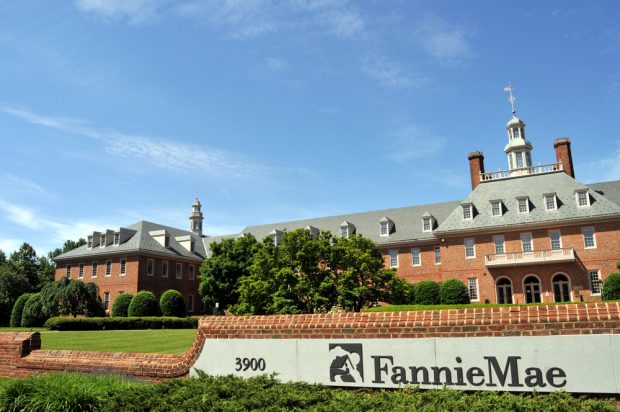
Two U.S. senators who have played key roles in trying to advancehousing-finance reform are acknowledging the legislative efforts toend government control of Fannie Mae and Freddie Mac are dead, at leastfor now.
|Republican Bob Corker of Tennessee and Democrat Mark Warner ofVirginia commented on the status of the two companies Wednesday ata Senate Banking Committee hearing with Federal Housing FinanceAgency Director Mel Watt.
|Corker and Warner tried to develop a bill that would havelargely preserved the operations of Fannie and Freddie whileopening the market to new competition. That effort foundered afterfailing to win support from progressives, who wanted to preservethe companies' affordable-housing mandates, and Congress has littletime left to consider major legislation before November's mid-termelections.
|“My sense is that these institutions may well stay inconservatorship for some time,” Corker said, adding that hebelieved President Donald Trump's administration might take somesort of action on Fannie and Freddie.
|The failure to pass legislation means that the twoquasi-governmental companies at the center of the U.S. mortgagemarket will have spent more than a decade under federal controlwithout an end in sight. The U.S. took control of Fannie andFreddie in 2008, injecting them with $187.5 billion in the wake ofthe financial crisis and then with another $4 billion to help themdeal with an adverse effect of Trump's tax cut. The companies havebecome profitable and paid taxpayers about $279 billion, whichdoesn't count as repaying the bailout.
Senator Pat Toomey, a Pennsylvania Republican, said at the hearingthat the large dividend payments since the crisis could arguablymean that taxpayers have been paid back. Under the original termsof their bailout agreements, Fannie and Freddie paid a 10%dividend, but in 2012, the government began to require them to sendnearly all of their profits to taxpayers. Toomey has expressedsimilar sentiments since at least 2014.
Such a move could benefit shareholders in Fannie's and Freddie'sstock. Several shareholders have sued the government, alleging thatthe move from a 10% dividend to a sweep of profits was illegal.Those lawsuits haven't seen any success thus far.
Corker and Warner both said they believe the FHFA is likely to takeadministrative steps to change Fannie and Freddie, especially afterTrump is able to replace Watt with a new director in 2019. Corker'sSenate term ends this year, and he isn't seeking reelection.
Warner said a new director might raise fees and lower maximummortgage limits in an effort to shrink the footprint of Fannie andFreddie.
|In response, Watt said he hoped a new FHFA director would takeinto account how such moves could disrupt the economy.
|Some progressives have hoped that Watt could choose to stay onafter his term ends, assuming that lawmakers haven't confirmed anew appointee by then. In an interview after the hearing, Watt saidhe hadn't thought about whether or not he would be willing to stayon and that he'd need to consult with his family.
|“I'm concerned about anything that adversely impacts housing andaffordability but there was a housing market before I got here, andthere will be a housing market after I'm gone,” said Watt ofWarner's concerns.
The Trump administration is having private meetings on what to dowith Fannie and Freddie but is still in the early stages ofdeveloping a plan, according to people familiar with the talks.Treasury Secretary Steven Mnuchin in a TV interview in April saidhe would focus on the issue after the November elections.
In his opening statement at the hearing, Watt said he woulddevelop a new rule to set capital requirements for Fannie andFreddie. He said the rule would be suspended during theconservatorship, as the current capital rule is, but that hethought its development would provide transparency and set prudentbusiness practices.
|Watt said he hasn't moved from his overarching belief thatCongress, rather than the FHFA, needs to determine the future ofFannie and Freddie.
|Copyright 2018 Bloomberg. All rightsreserved. This material may not be published, broadcast, rewritten,or redistributed.
Complete your profile to continue reading and get FREE access to CUTimes.com, part of your ALM digital membership.
Your access to unlimited CUTimes.com content isn’t changing.
Once you are an ALM digital member, you’ll receive:
- Critical CUTimes.com information including comprehensive product and service provider listings via the Marketplace Directory, CU Careers, resources from industry leaders, webcasts, and breaking news, analysis and more with our informative Newsletters.
- Exclusive discounts on ALM and CU Times events.
- Access to other award-winning ALM websites including Law.com and GlobeSt.com.
Already have an account? Sign In
© 2024 ALM Global, LLC, All Rights Reserved. Request academic re-use from www.copyright.com. All other uses, submit a request to [email protected]. For more information visit Asset & Logo Licensing.









